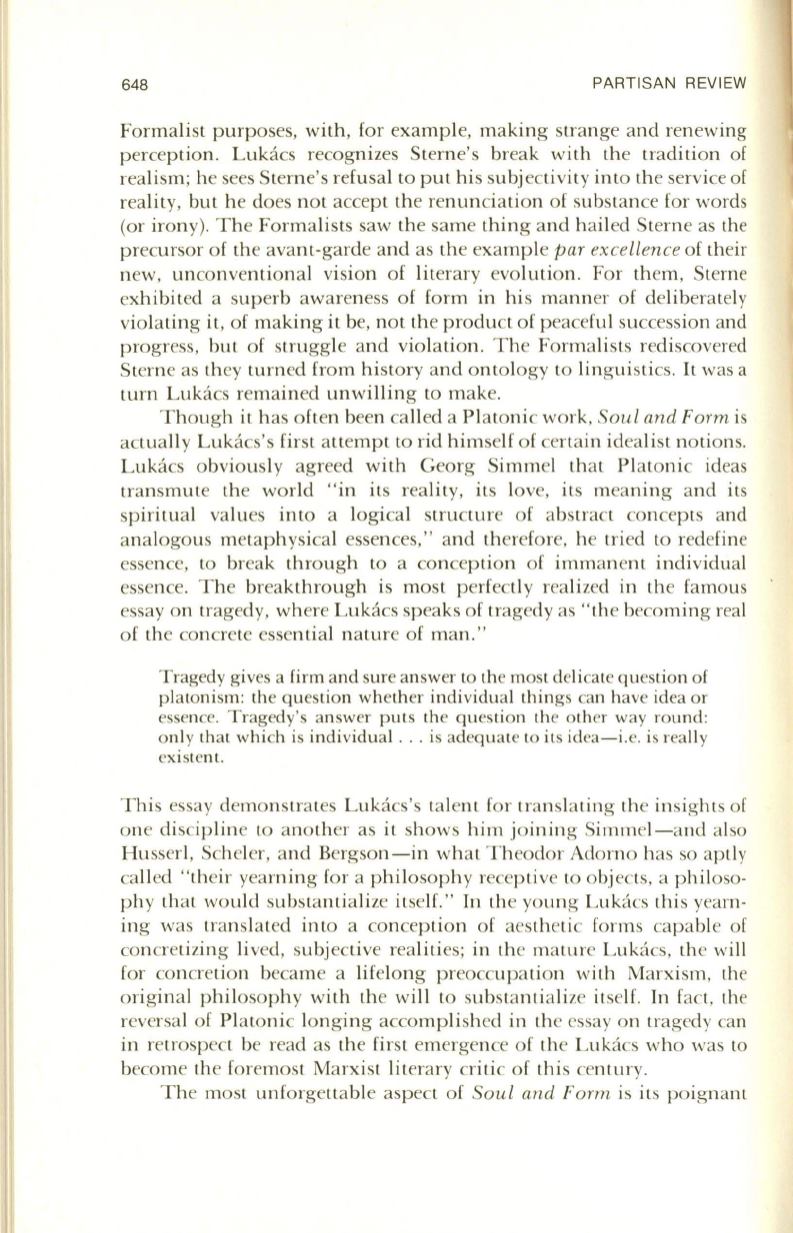
648
PARTISAN REVIEW
Formalist purposes, with, for exampl e, making strange and renewing
perception . Lukacs recogni zes Sterne's break with the tradition of
realism; he sees Sterne's refusal to put his subj ecti vity in to the service of
reality, but he does not accept the renuncia ti on of substance for words
(or irony). The Formalists saw the same thing and h ail ed Sterne as the
precursor of the avant-garde and as the example
par excellence
of their
new, unconventional vision of literary evo lution . For them, Sterne
exhibited a superb awa reness o f form in hi s manner o f deliberately
viola ting it, of making it be, no t the product of peaceful succession and
progress, but of struggle and viol a tion . The Formalists rediscovered
Sterne as they turned from hi story and ontology to lingui sti cs. It was a
turn Lukacs remained unwilling to make.
T hough it h as often been call ed a Pl a tonic wo rk,
Sou l and Form
is
actuall y Lukacs's first attempt to rid himself o f certain idealist no tions.
Lukacs obvio usly agreed with Georg Simmel that Pla toni c ideas
transmute the world " in its reality, its love, its meaning and its
spiritua l va lues into a logical structure o f abstract concepts and
analogous metaph ysical essen ces," and therefo re, he tried to redefine
essence, to break through to a conception of immanent individual
essence. The breakthrough is most perfectl y rea li zed in the famous
essay on tragedy, where Lukacs speaks of tragedy as " the becoming rea l
o f the concrete essential nature of man ."
T ragedy gives a firm and sure answer to the most deli cate question of
platonism: the question whether individual things can have idea or
essence. T ragedy's answer puts the question the other way round:
onl y that which is individual ... is adequate to its idea-i .e. is reall y
exi stent.
Thi s essay demo nstra tes Lukacs's talent fo r transla tin g the in sights of
one disc ipline to ano ther as it shows him jo inin g Simmel-and also
Hu sserl , Scheler, and Bergson-in wha t Theodor Ado rno has so aptl y
call ed " their yea rning fo r a philosophy receptive to obj ects, a philoso–
phy tha t wo uld substantialize itself. " In the young Lukacs thi s yearn–
ing was transla ted into a conceptio n o f aes theti c fo rms capabl e of
concretizing lived, subj ective rea lities; in the ma ture Lukacs, the will
for concretion became a lifelong preoccupa ti on with Ma rxi sm, the
original philosophy with the will to substanti a li ze itse lf. In fact, the
reversa l of Pla toni c longing accompli shed in th e essay on tragedy can
in retrospect be read as the first emergence o f the Lukacs who was to
become the fo remost Ma rxi st litera ry critic o f this century.
T he most unforgettable as pect of
Sou l and Form
is its po ignant


